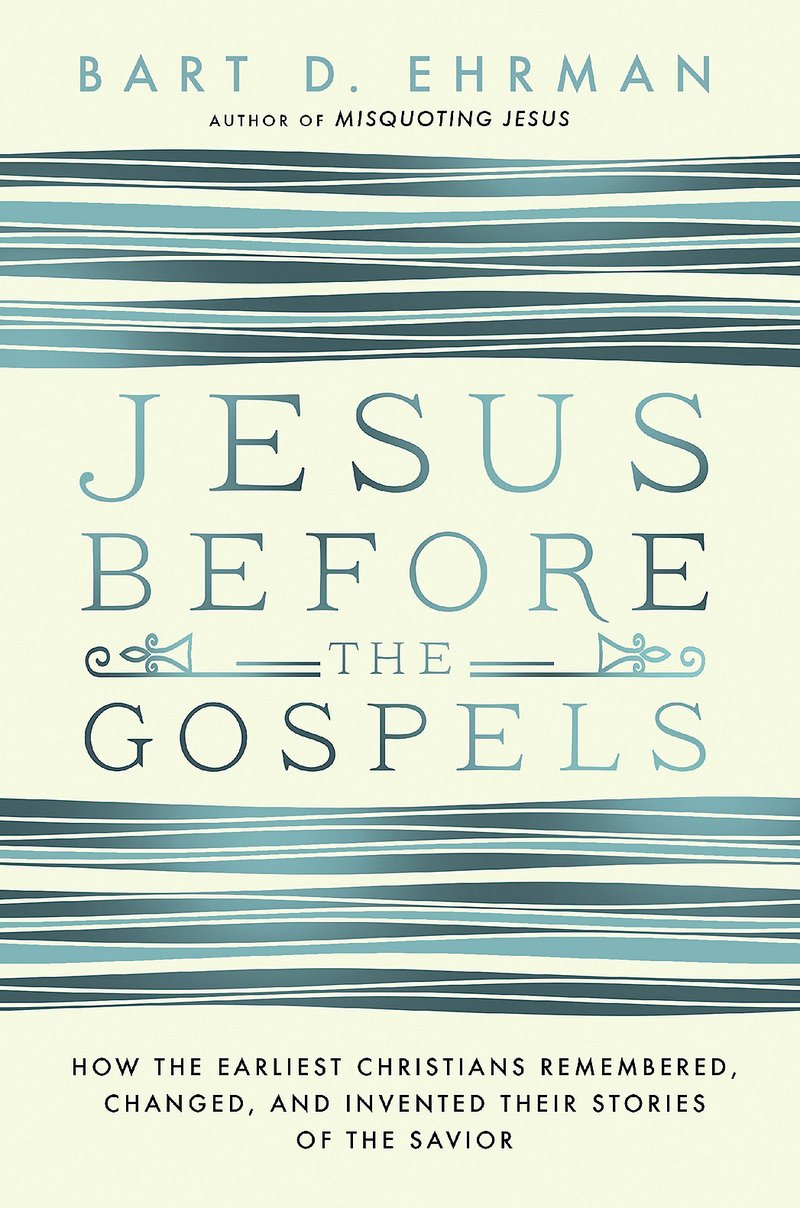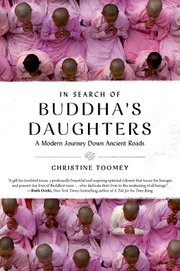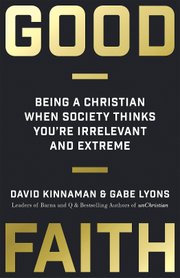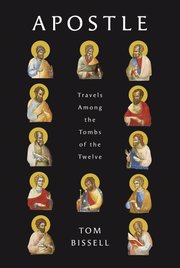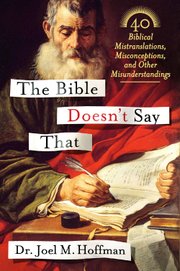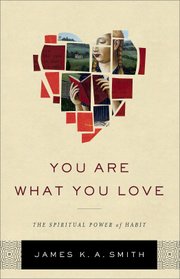Spring is here and warmer days are ahead. What better time to catch up on some reading while enjoying fresh air and sunshine? These faith-based titles are a sample of what's available. They include a search for the tombs of the Apostles, inspiring stories from Buddhist nuns and a look at misconceptions in the Bible.
Jesus Before the Gospels, by Bart D. Ehrman (HarperOne, $27.99) -- In his latest book, biblical scholar Ehrman turns his focus to the stories of Jesus in the Gospels, which many believe were told and retold faithfully and accurately through the years before being written down.
Ehrman said stories about the life and ministry of Jesus didn't begin to appear in writing until 40 to 65 years after his death and he questions what happened as the stories were passed along in those intervening years.
He writes, "Did they remember very well what they had heard from others (who had heard from others who had heard from others)? Were the stories they told accurate reflections of what they heard? Or, more remotely, of what Jesus said and did? Or had their stories been molded, and shaped, or even invented in the process of telling, remembering and retelling the stories?"
Subtitled, How the Earliest Christians Remembered, Changed and Invented Their Stories of the Savior, the book isn't Ehrman's first time delving into controversial biblical territory. He has confronted difficult questions of faith before in his best-sellers Misquoting Jesus and How Jesus Became God.
In Jesus Before the Gospels, Ehrman looks to what the fields of psychology, sociology and anthropology tell us about memory -- our memories, as well as the collective memory of a society -- to see what memory can tell us about the accuracy of what we know about Jesus.
This book, he writes, "is about the historical Jesus, memory, and distorted memory."
It's a fascinating look at how memory affects the stories we tell and even our recollection of history.
In Search of Buddha's Daughters: A Modern Journey Down Ancient Roads, by Christine Toomey (The Experiment, $24.95) -- Award-winning journalist Toomey spent two years traveling the world to learn about the women of Buddhism. Her travels took her to Nepal, India, Burma, Japan, France, the United Kingdom and the United States. She shares the diverse stories of several women from the East and West -- a police officer, a Bollywood star, an airline pilot, even a princess -- in her search to understand what drew all these women, some through heart-breaking hardships, to seek enlightenment as Buddhist nuns.
Toomey takes readers inside the world of Kung Fu-practicing nuns at the Druk Gawa Khilwa Nunnery in the mountains of Nepal. While some at the nunnery spend their early morning hours in meditation, some turn to martial arts for enlightenment, and for strength and confidence. The other women she meets during her travels are no less intriguing.
Through her conversations with these women, Toomey found inspiration. She writes, "In a world numbed by the amount of attention paid to violence, terrorism, and political and religious power struggles, I find it profoundly refreshing to come across women whose lives are dedicated to nurturing the opposite."
Good Faith, by David Kinnaman and Gabe Lyons (Baker Books, $19.99) -- Subtitled Being a Christian When Society Thinks You're Irrelevant and Extreme, the latest by Kinnaman and Lyons offers advice on how to be a Christian in today's increasingly secular society. The two men co-wrote the best-seller unChristian in 2007, which looked at how young people negatively view Christianity. They expand on that theme in Good Faith as they explore society's view that Christians are "irrelevant and extreme."
Kinnaman is president of the Barna Group, a research and communications company. Using research from the organization, he and Lyons explore some of the most contentious issues of the day -- politics, race, sexuality and prejudice. They also discuss religious extremism, society's views on the relevance of Christianity, the new "Moral Code," and changing cultural views on lesbian, gay, bisexual, transgender issues.
The authors also offer advice on how to navigate difficult conversations with friends and family members with differing views and how to respond with compassion and clarity while standing firm in your convictions. They also discuss how Christians can be "countercultural for the common good" by understanding the "other" -- those with differing faiths, by practicing hospitality and by loving "our gay friends and trusting God's design for sex."
Apostle: Travels Among the Tombs of the Twelve, by Tom Bissell (Pantheon Books, $28.95) -- Over a four-year period, Bissell traveled to nine countries to visit the tombs (or the supposed resting places) of the 12 Apostles to learn more about the men closest to Jesus. Bissell examines who these men were as he treks from Jerusalem to Rome, Turkey, Greece, Spain, France, India and Kyrgyzstan, visiting churches and talking with priests, scholars, tour guides and everyday people.
The book begins in Jerusalem with Judas Iscariot. Bissell vividly describes the landscape and the effect of the searing sun: "The sun did strange things to the landscape here, vivifying the dominating grays and sands, weakening the greens, and walling off thousands of hillside houses behind shimmering heat-haze force fields."
It was there that he visited Hakeldama or the "field of blood," where Judas was supposedly killed, a site he called "lonely and unendurably dull."
Part travelogue, part biblical research, part analysis, the book delves into the history of the lands visited, legends surrounding each man, and also what the Gospels have to say about them.
The Bible Doesn't Say That, by Joel M. Hoffman (Thomas Dunne Books, $25.99) -- Did the Ten Commandments really prohibit killing? Did David really kill Goliath? Does the Bible mention the Rapture? Hoffman answers these and other questions in his latest book, subtitled 40 Biblical Mistranslations, Misconceptions and Other Misunderstandings.
Hoffman's goal is to explore "what the Bible originally said and how it has been so widely misunderstood." He writes that there are five ways the Good Book gets distorted -- through ignorance, accident, a cultural gap, mistranslation and misrepresentation. Along with these are two other elements -- misapplying tradition and missing context.
The author shares 40 examples of distortions or misrepresentations in the Bible, touching on Noah's Ark, the Ten Commandments, the lineage of Jesus, marriage and divorce, and that famous apple (which he says wasn't an apple at all) in the Garden of Eden. He also discusses the more contentious issues of slavery, violence, abortion and homosexuality.
Hoffman, a biblical scholar who has worked on the faculty at Brandeis University and Hebrew Union College-Jewish Institute of Religion, was chief translator for My People's Prayer Book and My People's Passover Haggadah. He is the author of In the Beginning and The Bible's Cutting Room Floor.
You Are What You Love: The Spiritual Power of Habit, by James K.A. Smith (Brazos Press, $19.99) -- In You Are What You Love, Smith challenges the view of human beings as simply "thinking things" in search of knowledge and instead says that humans should focus more on what they love and desire. Ideally, he says, for Christians that would be worshipping God. But often, our "worship" is of other things -- shopping, sports or binge-watching our favorite TV show. These become our habits and our rituals.
"Humans are liturgical animals, creatures whose loves are shaped by our worship," Smith says. "But there are rival liturgies everywhere ... diverting attention away from God."
Smith writes that the liturgies -- the rituals -- we need to connect to God can be found in the ancient practices of the church, and through habit or repetition. Beyond Sunday mornings, he writes that Christians can practice their faith at home, at the dinner table, at work and in the community. He offers practical suggestions on how readers can realign their priorities to be true followers of Jesus.
Smith is professor of philosophy at Calvin College. He's the writer and editor of several books, including Imagining the Kingdom, Who's Afraid of Relativism, Desiring the Kingdom and Who's Afraid of Postmodernism?
Religion on 04/02/2016
